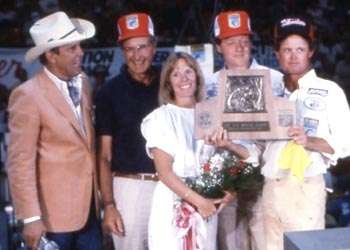
(Editor’s Note: Joe Mosby is the former Outdoors Editor of the Arkansas Gazette. He held that position for more than 30 years. In that time, he covered 26 Bassmaster Classics from 1974 to 1999. And is one of the longest, surviving members of the Classic Press Corps.)
The 1984 Bassmaster Classic was a classic.
It marked a turning point in the showcase event and in competitive fishing in general. It’s not too far a stretch to say bass fishing came of age in and around the old cotton town of Pine Bluff, Ark., that year.
Two presidents-to-be stood on the weigh-in stage at the jammed-to-the-rafters Pine Bluff Convention Center and took second billing to the amazing fishing performance of Rick Clunn then his memorable and often quoted speech of “only in America.”
Clunn blew away the rest of the Classic field from the opening gun with three consecutive limits of look-alike bass — three and three-quarter pounders — all caught along an underwater ledge close to the launching ramp.
The daily limit was seven in those days, and Clunn’s total catch was 75 pounds, 9 ounces, out of sight of runner-up Dr. Greg South’s 50 pounds.
This was summertime fishing in hot and humid south Arkansas.
Conventional fishing strategy would be to look for moving water, current, and that was on the main river. Look for structure, and the river was full of it to the sides of the traffic in the channel. So Clunn worked a backwater with no current and just a shallow rocky drop-off out in the middle.
The 1984 Classic got to Pine Bluff through default.
Arkansas was Scott’s aim all along, and the preceding several Classics were on rivers — 1980 St. Lawrence River, 1981 and 1982 Alabama River, 1983 Ohio River. But Little Rock with its downtown Statehouse Convention Center and large adjoining hotel was the choice, not Pine Bluff.
Arkansas officials up to and including Governor Bill Clinton pitched in enthusiastically to make arrangements, and at the last minute a city of Little Rock official vetoed plans to close one block of a side street next to the convention center during the Classic. A quick appeal was made, and other city leaders stood by the veto.
A phone call to Pine Bluff, a quick yes, and the Classic moved then made its site announcement.
In hindsight, the choice was beneficial. Little Rock’s facility may have handled 3,000 spectators. And it had room for the outdoor show. Parking was questionable. Pine Bluff’s Convention Center had seating for 8,000-plus and also room for the outdoor show. Parking was adequate.
Large cities as Classic sites had already come forth with Montgomery, Ala., in 1981 and 1982 and Cincinnati in 1983. Pine Bluff’s size was modest at 55,000 population, but this proved immaterial.
Spectators poured into the Pine Bluff Convention Center the first two competition days of the Classic and jammed aisles of the outdoor show. Hordes of them were from outside the area, from outside Arkansas.
Vacations scheduled to attend the Classic became a noticeable factor in 1984 and continue today.
Attention was on the Arkansas Classic contenders. Larry Nixon was the defending Classic champion. George Cochran was a rising star and already known as formidable on shallow water. Ricky Green was in the top tier of bass professionals with second, third and fourth Classic finishes on his resume. Rob Kilby was on the rise as a tournament professional.
When the Classic ended, Green in seventh place was the highest Arkansas angler, but scarcely anyone paid attention as Clunn had taken everything including the spotlight.
Vice President George Bush arrived, in shirt sleeves, with an entourage of Secret Service agents in suits in the Arkansas August heat. Friction arose at a back entrance to the convention center when federal agents told Governor Clinton to walk through a metal detector and his accompanying state policeman stepped forth with a stern “this is the governor of Arkansas.”
Words were exchanged. Clinton, top aide Betsy Wright and a newspaper writer stood silently to the side. Federal agents talked into their coat sleeves, radioing for instructions. A ruling finally came from somewhere on high — the governor could bypass the metal detector.
Doors had to be closed on the convention center as the crowd reached standing room only and hundreds more milled outside. A thousand, maybe more, fans were turned away.
Bush and Clinton came on stage with Ray Scott and tournament director Harold Sharp amid cheers, but the decibels ramped up when Clunn weighed in. He won going away, then, he took the microphone.
He had no notes, no written speech; but he told of his father apparently dying in a Houston hospital, and of his decision to stay in the Classic competition, because he knew his father wanted that.
“Only in America can we follow our dream of chasing little green fish,” he concluded.
Clunn’s father took a turn for the better the next day, made it through his crisis, and the Bassmaster Classic had come of age.
Space became a prime factor in choosing a site for the Classic — spectator seating space, outdoor show exhibit space. Portable bleachers from a softball field were far out of style.
Television goes where the crowds gather, and outdoor-oriented programming across the nation quickly followed up on that 1984 Classic.




